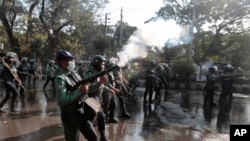At least five people were shot dead when police opened fire on hundreds of laborers demonstrating over unpaid wages and working hours in Bangladesh. The shooting occurred at the construction site of a Chinese-financed power plant in the southeastern part of the country, police officials said.
Anwar Hossain, a senior police officer in the city of Chittagong, said that police on the site of the future coal-fired Chittagong Power Plant (CPP) in the Banskhali area were forced to open fire Saturday after the protesters attacked them.
“The agitating laborers set fire to vehicles and other machineries on the site. When policemen on duty tried to control the violence, the protesters surrounded them and attacked them with bricks and stones,” Hossain said. “Police were caught in a situation like a siege and were forced to respond with gunfire.”
Azizul Islam, police chief of Banskhali, said that the protesters far outnumbered the officers who were on duty.
“There were around 50 policemen deployed at the site while the protesters who attacked them were over 2,000 [in number]. At least three policemen were injured,” Islam said. He also said police opened fire in response.
A junior police officer who did not want to be identified because he is not authorized to speak to the media, said, “there are Chinese nationals working at the under-construction plant. Police had to take extra precautions for the presence of the foreigners on the site.”
Some residents of Banskhali said the dispute over the wages had been taking place for several days.
“The laborers were seeking a hike in their wages. They were demanding clearance of their overdue wages, half workday on Fridays and daily breaks for namaaz (prayer) and Iftar (evening meal with which Muslims end the Ramadan fast) during Ramadan. The laborers were protesting also because they were being forced to work 10 hours a day,” Aminul Islam, a resident of Banskhali, who supported the demonstrating protesters, told VOA.
Islam said the clashes began with protesting laborers on one side and police and foreign workers on the other side.
“Soon, we heard the gunshots from the site of the clashes inside the complex of the power plant. Then we saw laborers with bullet injuries being carried out of the complex on way to the hospital,” Islam added.
Several doctors from Chittagong Medical College Hospital told local media that over a dozen people were lying in the hospital beds with gunshot wounds.
Chinese-based company
A consortium of two companies — Bangladesh-based S. Alam group and China’s Shandong Electric Power Construction Corporation III (SEPCOIII) — signed a deal in 2016 to jointly build the 1,320-megawatt power plant. The state-owned Bangladesh Power Development Board is to buy electricity from the consortium once the plant becomes operational.
The Chinese company has a 30% stake in the plant, which is one of a series of investment projects Beijing is pushing to build closer ties with Dhaka.
Soon after the S. Alam-SEPCOIII consortium began acquiring land for the proposed plant in 2016, experts said steps were being taken to build the plant without an Environmental Impact Assessment (EIA) or public consultation, which are mandatory. Those concerns were shared by many local residents.
In 2016, police fired on a group of local residents in Banskhali when they were protesting the construction of the plant. Four died on the spot and two others died in the hospital a few days later .
In 2017, clashes between groups on both sides of the issue led to the death of another local resident.
In a joint statement, 68 prominent citizens of Bangladesh, including many social activists, condemned Saturday’s killings in Banskhali.
“During the period of the ongoing pandemic, lives and livelihoods of working-class people have been severely jeopardized. In such a situation, non-payment of wages amounts to violation of labor laws and human rights,” the statement said.
Hong Kong-based Bangladeshi rights activist Mohammad Ashrafuzzaman said, the coal-fired-power plant like the one under construction in Banskhali exposes Bangladesh's double standards while the country seeks “climate justice” and compensation for being affected by global warming.
“In 2016 and 2017, during the anti-plant demonstrations, at least seven people were killed and over 100 were wounded. Perpetrators in those cases have not been brought to justice. The owner of S. Alam group is well-known for his connections in the higher echelons of the ruling party of Bangladesh,” Ashrafuzzaman, liaison officer of Asian Legal Resource Center in Hong Kong, told VOA.
“I am sure, none of the Saturday’s victims, who have lost lives and those sustained bullet wounds, will be afforded justice. The poor and the powerless people do not have access to justice in Bangladesh now,” Ashrafuzzaman said.




